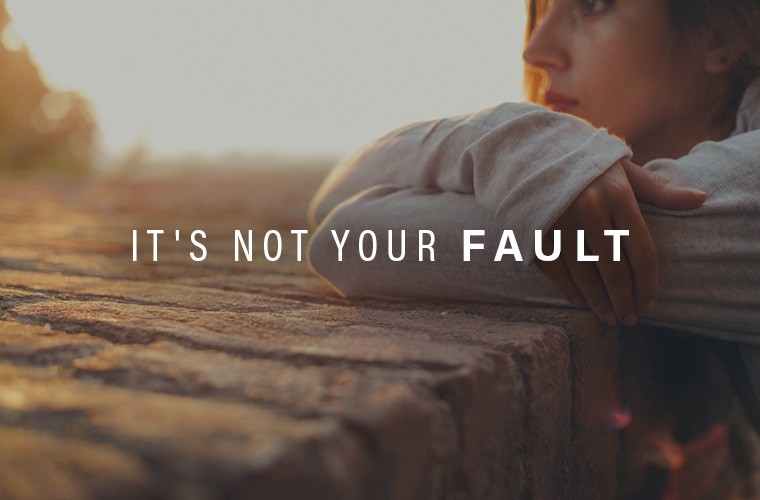Erin Petrey was pumped when she landed an impressive job as a special assistant to an ambassador in Washington, DC. As an international relations expert, it put her right at the forefront of where she needed to be: witnessing the relationship between US officials and her boss, the ambassador of an Arab country. For the first seven months, she loved it. But when a new chief of mission replaced the ambassador, things changed.
"It became unbearable," she says. "I would get text messages from him from 6 a.m. until midnight. He would grab me in the office and tried to kiss me a few times. He wouldn't sign my paycheck or approve my health insurance unless I would tell him sexual things. And this happened every single day."
Petrey is an assertive woman. She spoke up directly to her boss, telling him that he made her feel uncomfortable. He didn't stop. She felt there was no one else in the office to talk to about it since he was the one in charge.
What do you do when you're enduring harassment in the workplace and speaking up doesn't feel like an option, or seems like a losing battle?
"Then, I found out he was acting similarly to the Filipino women in the office, who worked as office assistants," she says. "Their visas were contingent upon embassy approval, so they really couldn't say anything. If they did, they [believed they] could lose their jobs and get deported."
Petrey's experience of feeling deadlocked unfortunately rings true for many women, something recently brought to light through the Harvey Weinstein allegations and #MeToo movement on social media.

{{post.sponsorText}}
What do you do when you're enduring harassment in the workplace and speaking up doesn't feel like an option? How do you take care of yourself emotionally while being exploited day in and day out? And if you do want to talk to your human resources department or your supervisor about it, what's the best way to do so in order to bring forth real change? Here, three women in very different situations share their stories, and a lawyer specializing in workplace conflict gives answers to these extremely tricky questions.
Keep reading for advice on what self-care looks like when you're being sexually abused or harassed at work—and how to speak up.

Just because it's happening to you doesn't mean it's your fault—not by a long shot
Jennifer Cook, who now works in the fashion industry, says looking back, she realizes she's endured sexual harassment at every job she's had, starting when she was a lifeguard in high school. "When you first get a job, you don't know what's appropriate and what isn't, which is why it's so important women are speaking out," she says.
Most recently, she just quit her job at a lingerie company largely because she was sick of her boss' objectifying comments. "He'd say things like how great we would look in the product or how he was excited to bring his son by the office to show him all the pretty girls who worked there." At a small company with only 10 employees and no HR department, Cook felt trapped.
"People told me to keep quiet because he had a wife and kids. And I did feel bad. I had to remind myself that he caused what the repercussions would be, not me."
"I'm someone who takes things very personally and takes work home with me," Cook says. To shift her focus elsewhere, she started yoga teacher training. She found the yoga principles extremely relatable to what she was going through. "I heard repeatedly how important it was to let things go and [tell yourself], 'It's not you, it's not yours.' That really hit home." If you're not in a position to quit your harmful job without another lined up (as Cook was ultimately able to do), mantras like these can help you shift the blame away from yourself—and back to its rightful recipient—while you look for a new position.
Petrey, the assistant to the chief of mission, similarly had to remind herself she was not the problem. "When I started to file reports, other people told me to keep quiet because he had a wife and kids. And I did feel bad. His daughter had Down syndrome and he had two kids in college. I had to remind myself that he caused what the repercussions would be, not me. But it was really, really hard."

The most effective way to speak up at work
When someone at work is making you feel uncomfortable, you should not hesitate to talk to your supervisor or HR department about it. Lawyer and workplace harassment expert Patti Perez says the bulk of what she's seen in her 20-plus years of experience falls into a murky gray area: A clear line hasn't been crossed, but women have an uneasy feeling around a male employee. "What I hear over and over is, 'While my boss doesn’t necessarily say anything sexual, he talks constantly about the fact he likes dating women my age and women who look like me,'" Perez says. Can anything be done when it's not so explicit? Absolutely.
According to Perez, there's a way to voice what is happening that will be most beneficial to you. "As emotionally disturbing as these situations are, it's important to be precise and communicate in business-speak," she says. Be clear with the time, place, and circumstances, and describe exactly what happened and how it makes you feel. One example: "My colleague always comments on the way I dress and compliments by body. It makes me feel like he views me as less of a professional than everyone else."
Can anything be done when the abuse is not so explicit? Absolutely.
Perez says this is a more effective route to go than using terms like "sexual harassment" out of the gate—even if that's exactly what you're experiencing. The sad truth is, it will often put the HR rep into company defense mode, already thinking ahead to a formal investigation and lawsuit. "While taking someone to court is always an option, I find that what most women want is to do their job in peace and for it not to reach that," Perez says. They just want the problem to stop.
Often, a peaceful resolution can be made: HR meets with the offending employee, tells them their actions aren't being perceived well, and—hopefully—they'll change their behavior. If it continues, then more serious action can be taken. And of course if any explicit sexual abuse happens in the workplace, a sit-down talk likely isn't going to cut it. But no matter how serious the accusations are, Perez maintains that being specific and precise will more likely lead to the outcome you want.
Something else Perez recommends: Find out if other coworkers are experiencing the same thing. "Not everyone may be brave enough to speak out, but look to see who at least has a reaction," she says. Then, you can go up to them later and say, "This is what I'm experiencing. Are you experiencing this too?"
"I'm a big believer in intuition and female intuition in particular," Perez says. "I've been doing this a long time, and I've honestly never had an experience where a woman has had this conversation with another person and the other person has said, 'No, you’re crazy. That person is totally fine.'" There is strength in numbers, so ask around. Just don't tell someone else's story without their permission.

What to do if your whole workplace culture is demoralizing
Before Ashley Louise started working with Well+Good Wellness Council member Claire Wasserman at the women's career empowerment organization Ladies Get Paid, she worked in the tech industry. "As a gay woman, I live at the intersection of being 'one of the guys' and being asked things like, 'Are you a tits girl or an ass girl?' to being outright sexually harassed," she says.
"At one of my jobs, a man nearly twice my age spanked me with a wood plank to the cry of, 'Come on, bend over, you know you like it!'" Louise says. "Industry events that were essential to my job are massive conferences in Vegas, with booth babes aplenty, gambling, strippers, and endless shots purchased by executives. The reality is that most of today’s workplaces are not built with women in mind."
Working in this type of culture weighed on Louise—so much so that she eventually left the industry altogether—but she realizes not everyone can leave their job, or wants to. "I got through it with the supportive network of women in my life, both Ladies Get Paid and my friends," she says. "Having a group of women who will support you whether you speak up about it or not is the most important thing."
"Having a group of women—who will support you whether you speak up about it or not—is the most important thing."
While Louise says the culture can't change unless people do speak up, she also stresses that you have to do what's right for you. "It's very important to not feel bad about the things you can and can't do," she says. Louise knows firsthand what it's like to report horrific workplace sexual abuse. Spoiler alert: It's not fun. "I can't speak for everyone, but personally, I didn't feel better or proud afterwards. I felt shame for playing it off like it was okay when it happened, and waves of blaming myself, wondering if something I did or said made him think his behavior was okay. Learning to not blame myself has been really hard. Change is hard."
Choosing which battles to fight is a personal call, but Louise says it's important to at least talk to someone—whether it's your partner, mom, mentor, or best friend. "Burying it is toxic. You don't want that," she says.
The good news is, more people are speaking out and the culture seems to be shifting. It's the silver lining to a very dark cloud—a cloud bigger than Harvey Weinstein, Terry Richardson, Bill O'Reilly, and the countless others accused of sexual abuse. The tide is changing—and it's about damn time.
In times like these, heaps of self-love are needed. Here are 11 tips for cultivating more of it. Plus, why now is the perfect time to become an activist.
Loading More Posts...